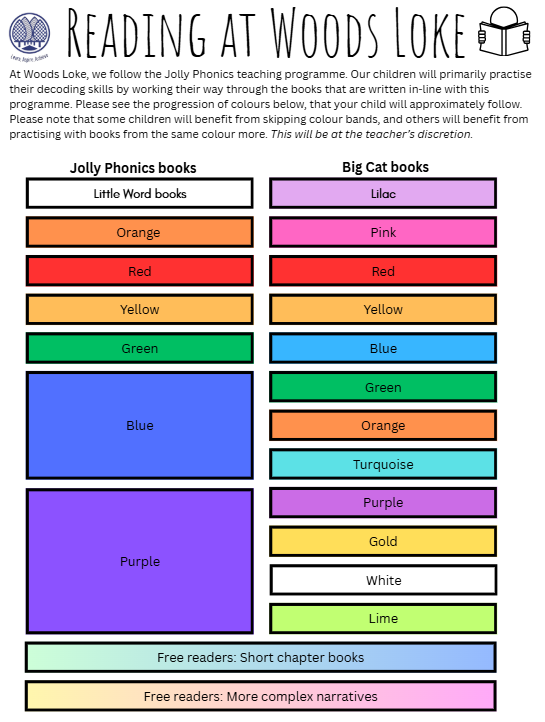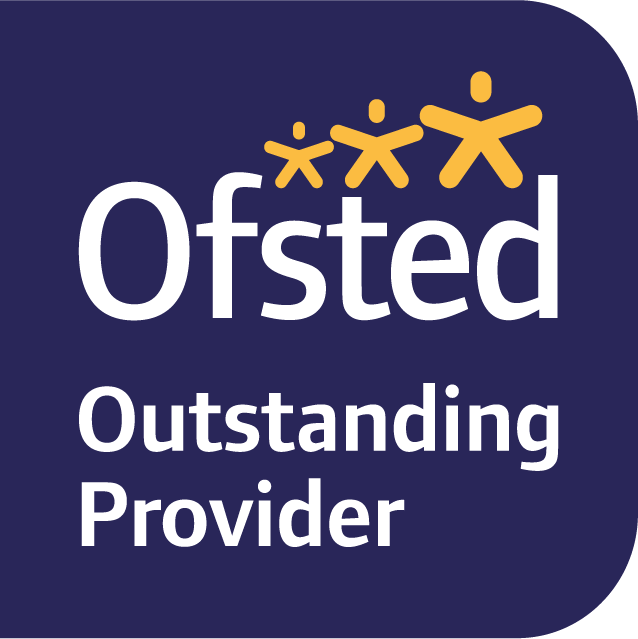Reading
“Reading is interwoven and part of the fabric of the entire curriculum. As a result, pupils get an exceptional range of reading experiences.”
“[Pupils] learn to love reading and have access to a rich variety of high-quality texts.”
Ofsted Report
At Woods Loke Primary School, we know that learning to read opens up a whole new world for our children to learn through and enjoy. Click on the headings below to find out more about the Woods Loke Reading Offer:
Teaching Reading - Key Reading Skills
In EYFS and Year 1, pupils are taught phonics. You can find more information about this on our dedicated phonics page. From Year 2 onwards, whilst phonic skills are refined and gaps addressed, there is a consistent taught approach throughout the school. These form part of Key English Skills lessons and happen at least twice a week. Using a wide variety of high quality and appropriate texts, children build their comprehension skills, developing strong vocabulary knowledge whilst continuing to improve their reading fluency.
Assessing Reading – Summative
The summative assessments in EYFS and Year 1 are all linked to phonic screening, which takes place at the end of Year 1.
This test helps us to identify children who have gaps in their phonic knowledge and may need further support in Year 2. In Years 2-5, pupils complete a summative assessment on a termly basis. This test clearly links to the Woods Loke Learning Grids and complements, rather than replaces, ongoing formative assessment strategies. Year 2 also use previous SATs papers where this is deemed beneficial to the children. In Year 6, past SATS papers support teacher judgements and help to prepare children for their future learning.
Assessing Reading – Formative
We use our exemplification and reading assessment grids to assess reading. These are completed on an ongoing basis and, like in other subjects, a combination of formative assessment completed during reading lessons and summative assessments. Further exemplification guidance is used by staff to accurately assess children.
Whole Class Reading
Throughout the school, children are read to by an adult in their classes regularly. Teachers will either use their class stimulus text or another which fits in with the learning taking place. Teachers read a huge variety of written material regularly with the children: fiction and non-fiction, stories, reports, diaries and poems. All year groups have access to challenging and interesting novels for teachers to read to their classes, exposing children to language and classic stories, which they may find too challenging to read independently.
The Woods Loke Curriculum has at its heart a set of cultural stimuli to help our children appreciate, understand and access a wide-range of ideas, attitudes and beliefs. As part of this, a reading stimulus is mapped out for each half-term and this is used to enrich and enliven the learning that takes place across the curriculum. It may be used in a variety of ways by the classes. For example, it may form the main focus for a topic, the theme for text-level work during writing sessions, the source of reading key skills work or a book enjoyed by the class as a whole.
Reading for Pleasure
All classes from year 2 onwards have a daily half-hour reading slot, focussed on giving children time to read for pleasure. In EYFS and year 1 they regularly find time to share stories with their classes. These sessions promote and instil a love of literature and allow children to independently apply the skills of decoding and comprehension that they have been taught.
Book Banding
At Woods Loke, we use book bands to help ensure that our children are reading a variety of high quality texts at an appropriate level that is carefully aligned with Jolly Phonics. All pupils should read a book that is fully decodable to them. Our bands follow the progression of the teaching of sounds in Jolly Phonics.
These bands are also used further up the school where children need more practise with decoding.
When children have developed a sound degree of fluency, they are encouraged to start selecting their own books based on individual interests. They will begin with shorter chapter books, and then increase their stamina by reading longer chapter books. This choice is supported by our school librarian and other adults and assessed for suitability to ensure that children select texts that balance challenge and enjoyment.

Reading Conferences
Throughout the school, we hold a weekly Reading Conference with each child. In EYFS and Key Stage 1 this is a good opportunity for adults to read with pupils and review their reading records, whereas further up the school it may involve more discussion about the text. This time helps to both inform formative assessment, motivate continued reading and assess the suitability of text choice - especially further up the school. Reading Journals are signed at this point by an adult and home reading expectations monitored.
Reading at Home and Recording Reading
Reading is one of the most important things that children learn whilst at school. This should be supported at home and we expect all of our children to read/be read to at home every day. This forms the main portion of our home learning agreement.
Every child has a Woods Loke Reading Journal. Parents/carers sign these to confirm that their child has been read with/read to themselves.
Support for Children Experiencing Difficulty Reading
We want all our children to be fluent readers – regardless of their starting point and barriers to learning.
For those children identified as working below the expected standard in reading, the school provides further support in various ways. Resources are available to encourage reluctant readers to engage more with the subject. Alongside this, TAs are trained in delivering catch-up reading and a range of other resources are used to support children further where this is considered appropriate.
Reading Across the Curriculum
At Woods Loke, reading is not something that is discrete from the other subjects. Across the curriculum, children use and apply their reading skills to help support and enrich their learning experience. Teachers will carefully plan reading opportunities and ensure that children have access to appropriate texts that support skill and knowledge acquisition in a range of subject areas.
Reading Engagement and Enrichment
Woods Loke School Library is run by a qualified librarian and is open Monday to Wednesday. We often open after school for parents to explore and choose books with their child. In addition, we host reading cafes for each year group, World Book Day celebrations and other reading focussed activities throughout the year. In EYFS they run bedtime story events and the school plays host to a variety of different authors who help to further open up reading to our school community.
For more information about our amazing library, please click here!


